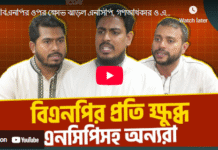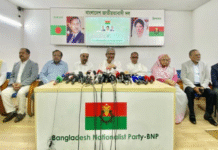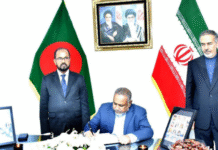Khadimul Islam
Bangladesh witnessed the worst ever political violence of recent times in the outgoing year with the space for opposition parties in and outside the parliament coming to be restricted because of government high-handedness.
Some leaders of the Awami League’s arch rival Bangladesh Nationalist Party said that the party had never faced any such situation in 2015 since its inception in 1978. Several thousand BNP leaders and activists, including the acting secretary general, had been behind bars for long while most of its offices remained locked up.
The incumbents who apparently started being in control after the January 5, 2014 general elections, which failed to win national and international support because of the boycott by all opposition parties, have so far consolidated their control after the BNP failed to come up with any result from its three-month countrywide blockade marked by violence.
Political Science Association president Ataur Rahman said that there was no politics in 2015 in the country. He blamed arm-twisting by the government, absence of democratic and cooperative
politics and desire of the ruling Awami League to hold on power for no politics in the outgoing year. He also said that there was virtually no opposition because of absence of tactics of opposition parties to make their existence louder.
At least 134 people were killed and scores were injured during the blockade marked by violence, arson, petrol bomb and crude bomb attacks on vehicles and trains.
At the beginning of the year, politics heated up as the police laid siege to BNP chairperson Khaleda Zia’s Gulshan office keeping her confined to the office on January 3, when she tried to go to visit party’s ailing leader Ruhul Kabir Rizvi. Electricity, telephone, internet and satellite cable connections to the office were snapped. Even at one point food supply from outside was stopped.
On January 5, the first anniversary of the 2014 general elections boycotted by all opposition parties, Khaleda called for an indefinite blockade of roads, railways and waterways as the police continued to lay siege to her office barring her from attending a rally. BNP was denied permission to hold the rally.
The government used force to contain the violence by ordering police to open fire at opposition ‘troublemakers’ and apprehending and prosecuting party leaders and activists. The police continued its crackdown on opposition even after the blockade lost its intensity in April.
Scores of opposition activists were shot dead in 2015. Several thousand opposition leaders and activists were either in jail or in hiding fearing arrest.
Acting BNP secretary general Mirza Fakhrul Islam Alamgir was sent to jail twice and released. Fakhrul was arrested on January 6 and released on bail on July 6. A Dhaka metropolitan magistrate sent Fakhrul to jail on November 3 rejecting his bail petitions in three cases of vandalism and arson filed on January 5 and 6. He was released on December 1 on bail granted by the High Court on November 24.
A number of BNP leaders including Ruhul Kabir Rizbi, Shamsher Mobin Chowdhury, Gayeshwar Chandra Roy, Mohammad Shahjahan, Mizanur Rahman Minu, Syed Moazzem Hossain Alal were arrested, sent to jail and released on bail. BNP leaders MK Anwar and MA Mannan are still in jail.
The government suspended around 500 local government representatives including mayors, chairmen and councillors backed by the BNP-led alliance and replaced them with councillors and vice-chairmen backed by the ruling Awami League or of its choice.
A number of grassroots level leaders and activists of BNP and its major ally the Jamaat-e-Islami joined the Awami League reportedly to protect themselves from harassment, arrest, prosecution, and because of financial crisis and frustration caused by the failure of the recent anti-government movement.
BNP leaders said that most of the top and senior leaders were becoming inactive on the pretext of age and sickness. Some senior leaders remained inactive fearing ‘enforced disappearance’ and to avoid arrest as several cases were filed against them.
BNP vice-chairman Abdullah Al Noman, however, told New Age on Monday that the ‘fascist’ and ‘undemocratic’ behaviour of the government and police harassment prevented the leaders and activists from taking to the street.
BNP joint secretary general Mohammad Shahjahan said that the government did not allow them to assemble to organise peaceful programmes even on issue of public interests.
At the end of the year, the government took unilateral decision to hold municipal polls with party nominations for mayoral positions and BNP contested the first ever partisan municipal polls considering it as an opportunity to fight back.
The government throughout the year did not allow opposition political parties to organise any programme. The police charged batons on the leaders and activists of Democratic Left Alliance as they were marching towards the Sunderbans for scrapping the Rampal power plant project near the world’s largest mangrove forest.
The government also locked BNP central office for over three months.
The parliament, according to Transparency International Bangladesh study, turned into a puppet theatre. The TIB study covered the proceedings of the House over 112 working days from July 2014 to June 2015 saying that the lawmakers spent most of their time on praising the government and criticising rival parties not represented in the House. The Jatiya Party is playing a dual role as a partner of the ruling coalition and as a domestic opposition in parliament, the report said.
The prime minister, Sheikh Hasina, in November again rejected BNP’s call for a national dialogue blaming the BNP chairperson for the deaths in arsons during the anti-government protests.
Source: New Age









